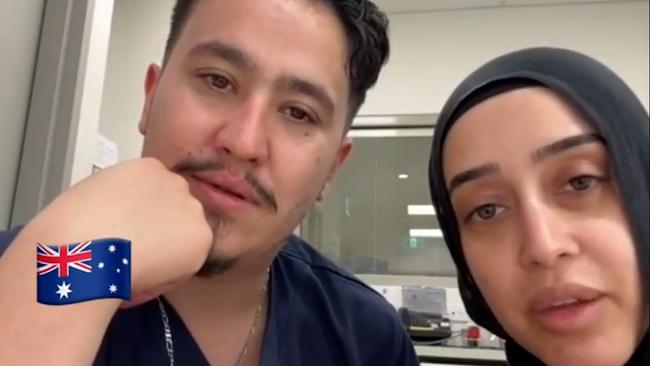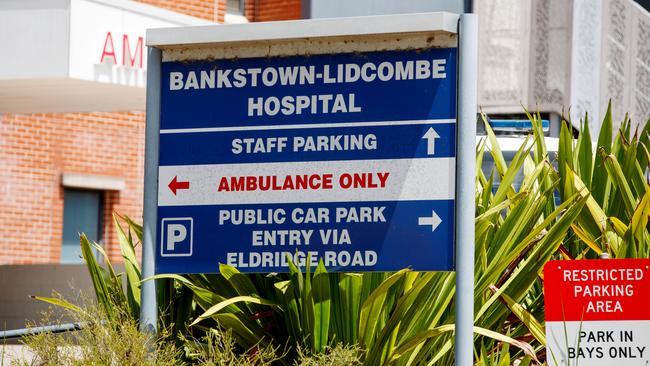
The facts are clear: two nurses took a break during their shift at Sydney’s Bankstown Hospital, went online and threatened to kill people from Israel who sought medical help.
If the goal is to prevent such conduct, punishment will not be enough. Nor will proposed new laws that would send people to prison in NSW for offensive language that falls short of inciting violence.
The conduct of those nurses demands a much broader response. The goal here should not merely be to punish, but to defeat an alien mindset that has taken root in our midst.
To achieve those goals we need a far more robust approach to civics and citizenship education. Our approach to this subject in schools and universities has been lax for too long.
The warning signs have long been apparent. In January last year, the Department of Home Affairs revealed that 100,000 migrants had failed the citizenship test in the 14 months to August 2023.
That test is a joke. It consists of 20 multiple-choice questions and applicants are permitted to attempt it three times.
This relaxed approach to Australian standards is quite a problem for a country in which 31 per cent of the population was born elsewhere and 50 per cent have at least one parent born overseas.
The same lax approach has downplayed the importance of civics and citizenship in schools.
Since 2004, the civics and citizenship knowledge of school students has been tested every few years through the National Assessment Program – Civics and Citizenship.
In 2004, a representative sample of students was tested and the proportion of year 10 students with proficiency in civics and citizenship was 39 per cent. In 2019, this had fallen to 38 per cent.
Those figures are from last month’s report on civics education by the federal parliament’s joint standing committee on electoral matters.

That report says: “A significant theme in this inquiry was that civics education, both formal and informal, is not working. Australians are struggling to fully participate in our democracy because the status quo is fragmented and inequitable.”
It recommended a nationally mandated and stand-alone civics and citizenship education curriculum and mandatory civics and citizenship training for all teachers.
This is a clear response to last year’s evidence to the committee from constitutional lawyer Anne Twomey. “The biggest problem we have is that the people who teach civics and citizenship frequently have not been trained in the area,” Twomey told the committee. “They don’t have that sort of store of background knowledge and confidence in the field to be able to translate what is the basic material that you need to teach, and to translate that into a way to connect that to current-day events in a way that makes it interesting to students.”
What happened at Bankstown Hospital is a wake-up call. Whether we like it or not, we are embroiled in a battle of ideas that is becoming a life or death struggle. At the moment we are not winning. We are barely trying.
Law is important but it results in punishment after the event. At best, it provides a deterrent for those who are already lost to the other side.
There are more effective ways of winning the battle for ideas – such as establishing a university-based centre for civics and citizenship, as proposed by teal independent Kate Chaney.
Teachers are on the front line of this fight and governments have failed to equip them with the training and support they need.
My organisation, the Rule of Law Education Centre, emphasised the need for civics to be both a curriculum priority and a dedicated unit as part of the university education degree for teachers.
Addressing this would have a more beneficial long-term impact than rushing through a law that criminalises speech that falls short of incitement of violence.
Such a law would amount to criminalising section 18C of the Racial Discrimination Act, which imposes civil liability for speech that offends, insults, humiliates or intimidates on the basis of race or national origin.
The problem with 18C is not just that it stifles debate that some find offensive. The real problem is that its key terms are vulnerable to subjective interpretation – which is the antithesis of good law.
If this sort uncertainty became a feature of criminal law in NSW, it would leave convictions vulnerable to the same sort of criticism that has accompanied certain civil cases involving 18C.
Instead of using the two nurses as an excuse to implement a vague law, NSW should consider the scope of a federal law already on the books.
Section 474.17 of the Commonwealth Criminal Code makes it a criminal offence punishable by five years in prison to use a “carriage service” to menace, harass or cause offence.
There is, of course, no suggestion that the two nurses have breached this provision.
Before turning to a supercharged version of 18C, politicians in NSW and elsewhere might find it useful to take another look at last month’s report by that joint committee of federal parliament on civics and citizenship.
It says the current implementation of civics and citizenship education through the Australian curriculum has resulted in students receiving “vastly different content” depending on their location.
After what happened at Bankstown Hospital, that sort of parochial indulgence needs to end.
Chris Merritt is vice-president of the Rule of Law Institute of Australia and the Rule of Law Education Centre.




When nurses threaten to kill patients because of their national origin, it demands a response. But how does anyone respond to such a shocking example of anti-Semitic hate?